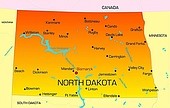North Dakota is definitely not known for its large number of residents. In fact, the state ranks 47th in terms of population, even though it’s 19th in terms of size. Despite that, this state features a number of natural resources, low unemployment, and has shown a good amount of growth, both economically and in terms of population, in recent years. Those in the LGBT community may not immediately think of North Dakota as a place to live, but there are some reasons why they might consider a move here.
History of LGBT Laws in North Dakota
 In 1862, the first laws banning sodomy were passed in Dakota Territory. However, while these laws were actually expanded several times, they were completely repealed in 1973 during a major overhaul of the state’s criminal codes.
In 1862, the first laws banning sodomy were passed in Dakota Territory. However, while these laws were actually expanded several times, they were completely repealed in 1973 during a major overhaul of the state’s criminal codes.
When it comes to same-sex marriage, however, North Dakota was not as progressive. The state constitution was amended in 2004 to limit marriage to one man and one woman. It also prohibited domestic partnerships and civil unions between members of the same sex. It wasn’t until the 2015 ruling of Obergefell v. Hodges that same-sex couples could marry in the state. However, the state constitution and statutes still contain the laws restricting marriage. A legislative committee is working on a plan to remove the language, but it’s not expected to finish its report until early 2017. The laws, however, are unenforceable.
Several lawsuits had been filed in 2014 seeking same-sex marriage, but all of these cases were stayed once the U.S. Supreme Court took up Obergefell v. Hodges. Following that case, a number of marriage licenses were issued in the state.
Parenting
Adoption laws have never expressly prevented LGBT individuals from adopting children, but there was a period of time when sexual orientation was taken into consideration in child custody cases. This decision was made during the 1980s by the North Dakota Supreme Court, although it was later reversed in 2003. However, private adoption agencies have the right to discriminate against LGBT couples or individuals if they can show that their religious beliefs instruct them to do so.
Protections
North Dakota has no state laws addressing discrimination based on either orientation or gender identity. However, several cities do. Fargo does list sexual orientation in its non-discrimination policy, but this policy only affects those employed by the city. Grand Forks has a non-discrimination policy that protects citizens on both orientation and identity in the areas of employment and rental housing.
